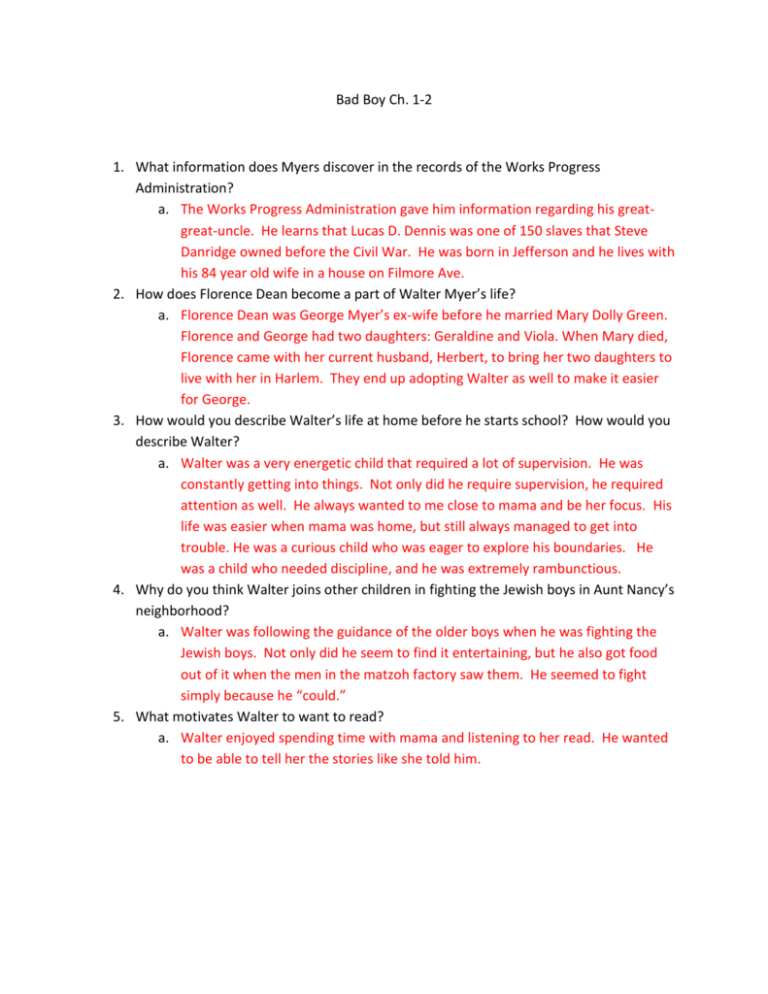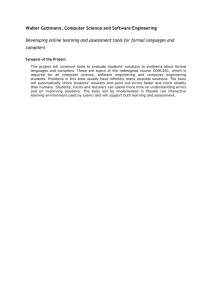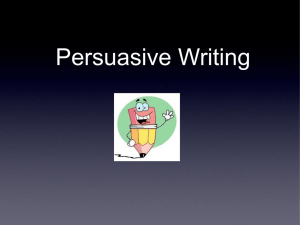Bad Boy 6-7 Questions
advertisement

Bad Boy Ch. 1-2 1. What information does Myers discover in the records of the Works Progress Administration? a. The Works Progress Administration gave him information regarding his greatgreat-uncle. He learns that Lucas D. Dennis was one of 150 slaves that Steve Danridge owned before the Civil War. He was born in Jefferson and he lives with his 84 year old wife in a house on Filmore Ave. 2. How does Florence Dean become a part of Walter Myer’s life? a. Florence Dean was George Myer’s ex-wife before he married Mary Dolly Green. Florence and George had two daughters: Geraldine and Viola. When Mary died, Florence came with her current husband, Herbert, to bring her two daughters to live with her in Harlem. They end up adopting Walter as well to make it easier for George. 3. How would you describe Walter’s life at home before he starts school? How would you describe Walter? a. Walter was a very energetic child that required a lot of supervision. He was constantly getting into things. Not only did he require supervision, he required attention as well. He always wanted to me close to mama and be her focus. His life was easier when mama was home, but still always managed to get into trouble. He was a curious child who was eager to explore his boundaries. He was a child who needed discipline, and he was extremely rambunctious. 4. Why do you think Walter joins other children in fighting the Jewish boys in Aunt Nancy’s neighborhood? a. Walter was following the guidance of the older boys when he was fighting the Jewish boys. Not only did he seem to find it entertaining, but he also got food out of it when the men in the matzoh factory saw them. He seemed to fight simply because he “could.” 5. What motivates Walter to want to read? a. Walter enjoyed spending time with mama and listening to her read. He wanted to be able to tell her the stories like she told him. Bad Boy Ch. 3-5 1. Why does Walter hit Manuel? Discuss Walter’s punishment and whether you think it is fair. a. Manuel was making fun of Walter’s speech issues in front of the class, and mocking his abilities. I think that Walter’s punishment of writing “I will never, never hit any student in Public School 125,” was not a fitting consequence. However, it was something that he still remembers to this day so it obviously made a lasting impression. I am not sure if the book doesn’t go into detail or if it didn’t happen, but it doesn’t seem as though Manuel was punished for the incident. 2. Describe Walter’s new home and neighborhood. Use specific details from the text in your description. a. Walter’s new home was an apartment on Morningside Avenue. He describes it as a “wide and beautiful.” Page 22 states: “My own apartment was, I believe, originally designed as a one-bedroom flat with a dining room, kitchen, living room, and nursery.” 3. Although Walter is excellent at reading and spelling, far more attention is paid to his speech problems. Explain how you think this makes him feel and why? a. This is frustrating to Walter. He knows that he is smart and a gifted reader, he just can’t get his thoughts from his brain to his mouth to come out correctly. He wants so badly to be a “good student”, but he is often overlooked or made fun of due to his speech impediment. Praising a person’s strengths is important because it can give them the confidence to improve their weakness. 4. What happens in Walter’s fight with Bunny? Explain why you think Walter behaves as he does in this situation. a. A student was antagonizing the fight, telling Bunny that Walter was going to give him a bloody nose. Bunny then panicked and swung at Walter, knocking him down. Walter was wrongfully blamed for the fight; however, past behavior made it believable. Walter through the book out of frustration due to the injustice of the situation. 5. On page 35, the author takes a step back from his own life to give a description of the broader political and cultural climate of 1947. Is this good for someone to do when writing an autobiographical work? Why or why not? 6. 7. 8. 9. a. In this situation it was a very valid approach. It is important that the reader fully understand and grasp what was going on during that time in history. Without that background knowledge the stories of Walter’s childhood wouldn’t have had the same meaning. Walter recalls attempting to lynch another boy in the neighborhood. Discuss the tone Walter uses when recalling the situation. Do you think he understood the seriousness of his actions? Do you think he should’ve been more severely punished for his behavior? a. When Walter was discussing the incident he was using a very nonchalant tone. “Even if I hadn’t been recuperating from my appendectomy, I don’t think I would’ve received a beating for a simple hanging.” (pg 40) I don’t believe that any of the boys understood the seriousness of the situation. The action would have caused a consequence way more serious than having to white wash a wall; they could have “accidentally” murdered their friend. In what ways is Walter’s community sensitive to racial differences? In what ways is in insensitive to these issues? a. One noticeable thing about the community’s sensitivity to racial differences is the integrated schools and church. Walter is also not ridiculed for having mixed parents. The community was sensitive to the tone or degree of black. Pg. 40 “The Boones were ultra-light-skinned black who had professional jobs and were upward bound.” “Light skin was a definite plus in our community, and it was common to talk in a negative manner about a person with very dark skin.” What do you think of Mrs. Conway? a. I feel that Mrs. Conway, like many teachers from the time period, was a very strict teacher who jumped to conclusions easily. However, I also feel like she truly wanted to help Walter when she started giving him different books to read. She seemed to appreciate his intelligence and desire to learn. Explain what you think Walter means when he comments that “the ‘me’ who read the books… seemed more real than the ‘me’ who played ball in the streets”. (p. 46) a. While Walter enjoyed sports and interacting with his peers while playing games, he loved books. Getting lost in books and writing was something that made him feel safe and secure. They took him to his own little world, but it was a world he felt he had to hide in, not a world that he could truly show to his peers. He was first able to discover his power of imagination and his identity as a creative person. Bad Boy Ch. 6-7 1. Recalling summer in Harlem, Walter comments that black people seemed to fit into three categories- churchgoer, entertainer, or athlete. Discuss how Walter comes up with his three categories. What is necessary for people to think freely and creatively about their dreams, desires, and identity? 2. Where does Walter learn what it means to be a boy? Why does he hide his love of books? 3. In Mr. Lasher’s sixth-grade class, Walter’s grades and behavior improve. Why do you think Walter does better in this class than in previous classes? 4. Why do you think that Walter tells his father that his mother beat him rather than admitting the truth- that he was injured trying to hitch a ride on a taxi? Discuss whether or not you think Walter’s lie is justifiable and why. Why do you think Walter’s mother responds as she does? 5. Explain what events serve to remind Walter that he is “not the center of the universe” (p. 65.) How is the timing of these events ironic? 6. Walter wants to be good, but also wants to be accepted by his peers. Are those two ideas necessarily mutually exclusive? How might Walter’s interest in reading separate him from his peers and his parents? Does having an interest that makes you feel different from others mean that you cannot have other things in common with people? 7. Why do you think the author mentions the two pages about slavery in his seventh-grade American history book? Bad Boy Ch. 8-9 1. Why do you think Walter finds it difficult to write about his own community and Harlem? What is ironic about his dilemma and the way he communicates it to the readers? a. As a boy, Walter doesn’t think that Harlem compares to the places other writers have described. He has not been exposed to writers who could write about city life in a beautiful way, and in turn, has a hard time knowing how to describe his city life in the same graceful style as the Romantic British poets. Ironically, as an adult, Walter is obviously aware of Harlem’s beauty and has no trouble capturing it in vivid detail. 2. Do you think it is fair for people to dislike Melba Valle because she is trying to “make herself different from the others” (p.83)? Explain your opinion. a. Walter’s description of Melba does not depict her as a pretentious person. It may be that the other residents in Walter’s building feel threatened by Melba’s success. Rather than rejoicing in her success, they are jealous of it and feel worse about themselves because they have not achieved the same level of success in their lives. People who feel this way may discourage others from pursuing their ambitions, even if their motives for doing so are pure. 3. Discuss the following quote: “What I was doing, without knowing it, was accepting the idea that whites were more valuable than blacks. I knew I would never be white, and therefore I wanted to be without race” (p. 85-86). a. The America in which young Walter is growing up is predominantly racist, and consequently, he must accept that a wide socioeconomic gap exists between whites and blacks. At the same time, he wishes to realize his ideals by somehow transcending race and achieving something universally recognized as a great accomplishment. 4. Discuss the purpose of the club started by boys in Walter’s class. What is the appeal of such a group? What, if any, are the dangers? a. Some may see a similarity between this club and gang activity- a group of people trying to be macho and prove they are special. Benefits include having a place to belong and having a group of people to influence. Dangers include doing things without reason or personal conviction- there is more peer pressure to do what is “macho” or “cool,” so the individual takes less responsibility for his or her own actions in order to please the group. This could mean, depending on the group-approved behavior, getting in trouble with the law or suffering injury. 5. Many years after the fact, Walter still feels the sting of being excluded from Eddie’s party. Discuss why excluding someone, for any reason, may ne hurtful to him/her. Why do you think this issue still bothers Walter? a. Deliberately excluding someone from an event or activity is a way of saying that they are inferior to those who were included. Walter was angered and saddened to be excluded from the party on the basis of something he cannot change, his skin color. He realizes that Eddie does not see him as a unique human being, but rather as an insignificant member of a group of people whom he views as inferior to whites. 6. Walter becomes fascinated with Elizabeth Barrett Browning’s poems as he learns more about Browning’s life. Discuss whether or not you think a writer’s work is more or less appealing when the reader knows something about the author’s real life. a. Some say it is easier to connect with a piece of writing when it is framed within a specific emotional context. Others feel that knowing the specific emotional context of a work leaves it open to less interpretation and detracts from its universality. 7. Examine how you think Walter’s father feels about his son’s greatest achievements being in reading and writing while he himself cannot read. a. I think he is proud to have a son who excels academically and may eventually have financial security. I could also see how Walter’s achievements could make his father feel distant or ashamed because he cannot share in them.







